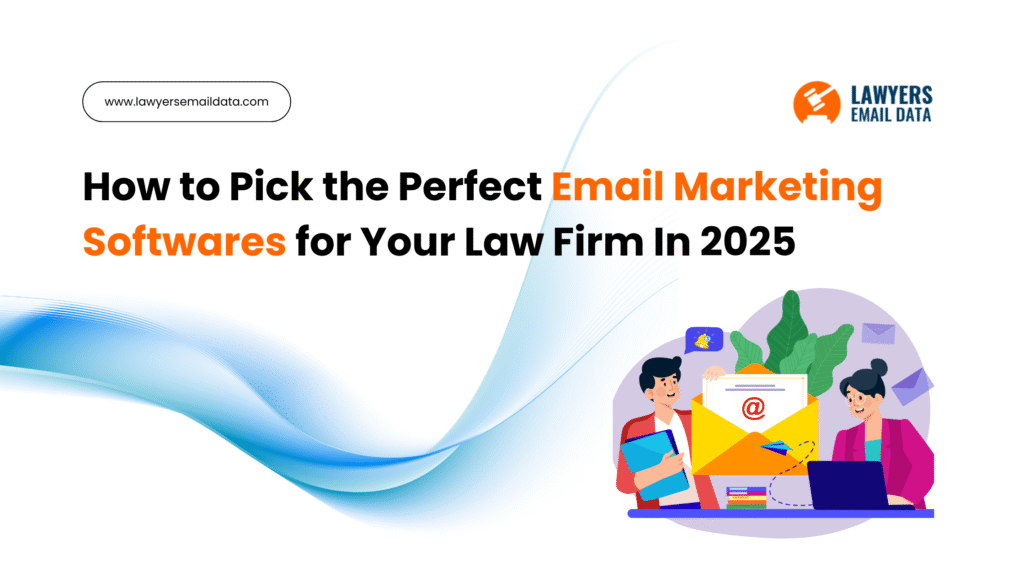Introduction: Why Choosing the Right Email Marketing Software Matters
If you want to pick the perfect email marketing software for lawyer firms in 2025, start by focusing on three essentials: compliance, integration, and personalization. The right platform should keep you legally compliant, seamlessly connect with your CRM or practice management tools, and allow you to segment and personalize messages for different client groups. Unlike generic business tools, law firms require software that respects attorney–client confidentiality, automates lead nurturing, and delivers measurable results. In short, the “perfect” software is not just popular—it’s the one that aligns with your firm’s goals, audience, and compliance obligations.
Email is still one of the most effective ways to build relationships with clients, retain loyalty, and attract new business. But not all tools are equal-choosing the wrong software can waste time, money, and opportunities. This guide walks you through everything your law firm needs to know about email marketing in 2025, from must-have features to the best platforms available, common mistakes to avoid, and how verified attorney email lists can make or break your campaigns.
Why Email Marketing Still Works for Law Firms in 2025
Email marketing still works for law firms in 2025 because it offers the highest ROI, direct communication with clients, and the ability to nurture long sales cycles better than any other channel. While AI Voice bots, & chatbots, LinkedIn, and SEO play important roles, email remains the only platform where firms fully own their audience, control the message, and build lasting trust through personalized, private communication.
- Direct Communication: Emails go straight to your clients’ inboxes, where they actively make decisions. Unlike social media, your message isn’t lost in endless feeds.
- Cost-Effective: Email campaigns are affordable and often deliver higher ROI than paid ads. You can reach many clients without spending heavily on marketing.
- Personalization: Segmenting your email list allows you to send content relevant to specific practice areas, events, or consultations. Personalized emails feel more engaging and valuable to recipients.
- Client Retention: Regular newsletters build trust and strengthen relationships with existing clients. Staying top-of-mind ensures clients think of your firm when legal needs arise.
Think of email as the digital handshake between your law firm and its audience—it builds familiarity and trust faster than any banner ad or social post.
Essential Email Marketing Software Features Every Law Firm Needs
Not all email marketing platforms are created equal—and what works for an e-commerce brand or a SaaS company won’t necessarily work for a law firm. Law firms operate in a highly regulated, trust-driven environment where confidentiality, compliance, and client relationships are paramount. That means your email software should do more than just send newsletters. It needs to support secure communication, precise targeting, and automation tailored to the unique sales cycle of legal services.
Below are the five non-negotiable features
A) Compliance & Security
Law firms handle sensitive client data and must adhere to regulations:
- ABA guidelines for attorney advertising.
- CAN-SPAM & GDPR rules for consent.
- Confidentiality of attorney–client communications.
The right software must include:
- Opt-in/opt-out management.
- Encrypted email delivery.
- Secure storage for contact data.
B) Ease of Use & Automation
Busy attorneys don’t have time to design emails from scratch. Look for:
- Drag-and-drop templates for legal newsletters.
- Automated workflows (welcome emails, appointment reminders, event invitations).
- Scheduling that works across multiple time zones.
C) Integration with Law Firm Tools
A must-have in 2025: seamless integration.
- Sync with Clio, MyCase, or Salesforce.
- Pulls client data automatically to reduce manual entry.
- Keeps case and client info up to date.
D) Personalization & Segmentation
Generic blasts don’t work anymore. Instead:
- Segment by practice area (family law, corporate law, real estate law).
- Segment by engagement level (new inquiries vs. loyal clients).
- Segment by location and firm size if targeting other attorneys.
This ensures every email feels relevant to the recipient.
E) Analytics & Reporting
The perfect software should show:
- Open rates, click-through rates, and conversions.
- Client engagement trends over time.
- Insights into which practice areas drive the most responses.
Without tracking, you can’t improve.
The Top Email Marketing Tools for Law Firms in 2025
Choosing the right email marketing tool is crucial for law firms to engage clients, nurture leads, and streamline communication. The best platform depends on your firm’s size, goals, and required features.
- Mailchimp → Ideal for small firms looking for affordability and simplicity. It offers easy-to-use templates, automation, and basic analytics to get campaigns started quickly.
- HubSpot → Suited for larger practices needing advanced automation and workflow capabilities. It integrates CRM, marketing, and reporting for a seamless client communication experience.
- ActiveCampaign → Excellent for firms focusing on personalization and lead nurturing. It allows targeted campaigns based on client behavior and interactions, improving engagement.
- Constant Contact → A user-friendly option for beginner firms. It provides simple email creation, list management, and tracking tools without steep learning curves.
- Law-Specific CRMs (Clio Grow, PracticePanther, Lawmatics) → Purpose-built solutions with built-in compliance for law firms. They combine email marketing with client management and legal workflow tools.
Each tool has unique strengths, so evaluate your firm’s size, audience, and marketing goals to choose the best fit.
5 Tips for Crafting Compelling Email Content
Strong email content engages your readers, builds trust, and encourages action. Focus on clarity, personalization, and value to make each email meaningful.
1. Keep Your Message Clear and Focused
Stick to one main idea per email. Busy attorneys prefer concise, straightforward content that delivers value without unnecessary details.
2. Personalize the Content
Address recipients by name and reference their practice area or recent interests. Personalized emails feel relevant and increase engagement.
3. Provide Valuable Insights
Share actionable tips, legal updates, case studies, or practical advice. Content that helps recipients solve problems positions your firm as a trusted resource.
4. Include a Clear Call-to-Action (CTA)
Guide readers on the next step—book a consultation, join a webinar, or download a resource. A clear CTA increases response and conversion rates.
5. Make It Easy to Scan
Use short paragraphs, bullet points, and headings. Most readers skim emails, so scannable content improves readability and engagement.
Common Mistakes Law Firms Make When Choosing Software
Too many firms waste money on tools that don’t serve their needs. Watch out for these pitfalls:
- Picking generic platforms without compliance features.
- Prioritizing price over security and functionality.
- Ignoring integration with law firm CRMs.
- Buying advanced software but underutilizing features.
- Overlooking the importance of data quality in email campaigns.
Why Data Quality Matters: The Role of Verified Attorney Email Lists
Even the best software fails without clean, accurate data. Outdated or incorrect contacts lead to:
- High bounce rates.
- Wasted time and money.
- Poor sender reputation.
This is why pairing your email platform with a verified attorney email list is essential. These lists provide:
- Updated contact details of decision-makers.
- Segmentation by job role, firm size, and location.
- Higher open and reply rates.
Example: One corporate law firm saw reply rates double when they combined automation software with a segmented attorney email list.
Case Study: Smart Firms Using the Right Tools
A leading legal tech firm boosted lead engagement by implementing automated email sequences and syncing with a verified attorney list. By automating follow-ups and tailoring messages to different practice areas, their attorneys gained more time for client consultations while nurturing leads around the clock.
Lesson: The right software + quality email data = higher engagement, fewer missed opportunities.
Step-by-Step Action Plan to Pick the Right Software
Choosing the perfect email marketing software for your law firm doesn’t have to be overwhelming. By breaking the process into clear steps, you can confidently evaluate tools and make a decision that drives real results. Here’s a detailed roadmap for 2025:
1. Define Your Goals
Before you even look at software options, get clarity on what you want to achieve. Are you aiming to attract new clients, keep existing ones engaged, or build stronger referral networks? For example, if client retention is your focus, you’ll need tools with automated follow-ups and segmentation by case type. If acquisition is the goal, look for advanced lead-tracking and integration with your website forms. Clearly defined goals act as the foundation for your software decision and prevent you from buying features you’ll never use.
2. Audit Compliance Requirements
Law firms deal with sensitive client information, so compliance is non-negotiable. Make sure the platform you choose aligns with legal, ethical, and privacy standards relevant in 2025. This includes data protection laws in your region (such as CCPA in California or GDPR for clients in the EU) and email-specific regulations like CAN-SPAM. The right software should have built-in compliance features such as consent management, opt-out handling, and secure data storage. By auditing compliance first, you’ll avoid legal risks that could damage your firm’s reputation.
3. Test CRM and System Integrations
Your email marketing tool should work hand-in-hand with your existing systems, particularly your CRM (Client Relationship Management) software. A strong integration allows seamless syncing of client data, case histories, and communications so you can run targeted campaigns without manual data entry. For example, when a new lead fills out a consultation form on your website, the integration should automatically add them to the right email segment. Before committing, test whether the platform integrates with tools your firm already uses-otherwise, you’ll end up with a siloed system that wastes time.
4. Evaluate Must-Have Features
Not all features carry equal weight, and law firms have different needs than retail or SaaS businesses. Focus on the essentials:
- Automation → save time by automating welcome emails, reminders for consultations, or follow-ups after court dates.
- Personalization → Use client-specific details (practice area, location, case type) to make emails more relevant.
- Analytics & Reporting → Track open rates, click-through, and responses to measure ROI.
- Segmentation → Divide your audience into prospects, active clients, and past clients for tailored messaging.
By prioritizing these features, you’ll avoid shiny add-ons that inflate costs but don’t serve your firm’s goals.
5. Match with High-Quality Data
Even the best email platform won’t deliver results if your contact list is outdated or inaccurate. That’s why pairing your software with a verified attorney email list or decision-maker database is crucial. High-quality data ensures your emails reach real people in the right roles-whether it’s general counsels, corporate attorneys, or law firm partners. Without accurate data, you’ll face bounces, low engagement, and wasted effort.
6. Launch Small, Measurable Campaigns
Instead of rolling out a massive campaign right away, start with a small, focused test. For example, send a 5-part nurture sequence to a segment of corporate attorneys and track the response. Measure open rates, replies, and consultations booked. Based on these results, refine your subject lines, content, and timing before scaling up. This approach reduces risk, provides real-world data, and helps you understand which strategies resonate best with your audience.
Future Trends in Legal Email Marketing
Legal email marketing is evolving rapidly, driven by technology and data-driven insights. AI is becoming a key tool for drafting emails, suggesting subject lines, and personalizing content at scale. Automation allows law firms to send timely follow-ups, nurture leads, and manage drip campaigns efficiently. Multi-channel integration-combining email with social media, webinars, or events-creates a cohesive marketing experience. Data analytics enables firms to track engagement, optimize campaigns, and measure ROI more accurately, helping law firms make smarter marketing decisions.
Using AI to Improve Your Email Campaigns Safely
AI offers law firms a powerful way to streamline email marketing, but human oversight remains essential. Tools like ChatGPT or Jasper can draft messages, recommend subject lines, and suggest personalization, saving time and increasing engagement. Review AI-generated content carefully to maintain legal accuracy, professional tone, and compliance. Avoid over-promising or providing misleading information. When used responsibly, AI enhances efficiency while allowing law firms to deliver relevant, high-quality content that resonates with recipients.
Final Thoughts
The best email marketing software for your law firm in 2025 isn’t about flashy features-it’s about security, compliance, integration, and personalization. Choosing the right tool will save time, build stronger relationships, and increase ROI.
But remember software alone can’t guarantee results. Your campaigns are only as good as the data behind them. A verified attorney email list ensures you’re reaching the right decision-makers, not wasting efforts on outdated contacts.
Ready to market smarter in 2025? Explore our Lawyers Email Data today and connect with the right legal professionals across the world.
Frequently Asked Questions (FAQs)
Mailchimp and Constant Contact are ideal for small law firms. They’re affordable, user-friendly, and offer essential features like automation, templates, and analytics to get campaigns running quickly.
Yes. AI tools like ChatGPT or Jasper help draft personalized, compliant emails faster. Human review is still necessary to ensure accuracy and maintain professional tone.
AI can create subject lines, generate email content, and suggest personalization for higher engagement. Reviewing the output ensures legal accuracy and brand consistency.
Focus on niche targeting, personalized messaging, and valuable content. Using AI tools and verified attorney email lists helps small firms reach the right audience efficiently.
Monthly newsletters or targeted campaigns work best. Avoid over-emailing to prevent unsubscribes and keep engagement high.
Combine email campaigns with LinkedIn outreach, webinars, and content marketing. This multi-channel approach strengthens lead nurturing and builds credibility.



